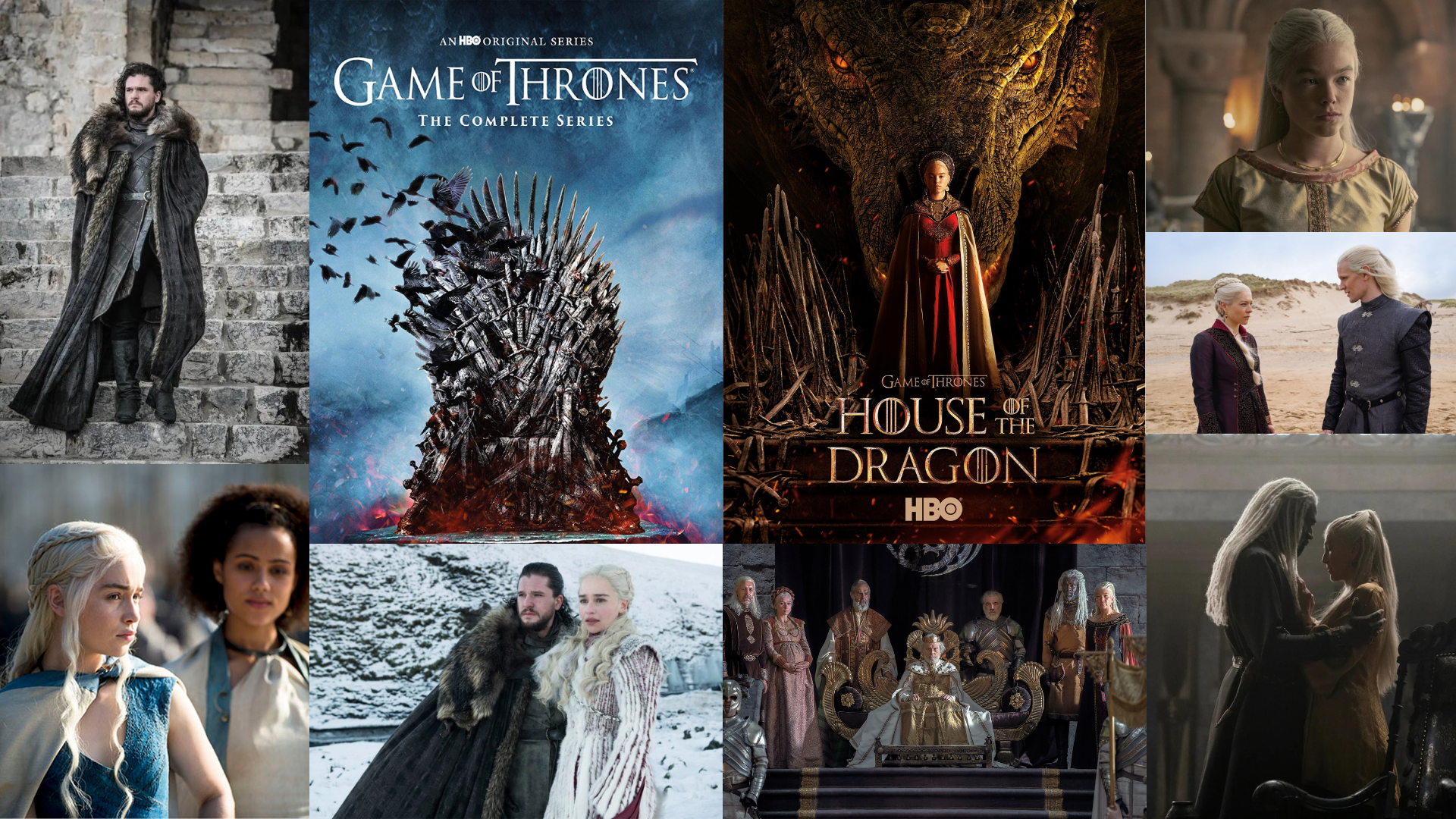‘House of the Dragon’ vs ‘Game of Thrones’: which show sits on the Iron Throne?
In the wake of HBO's ‘House of the Dragon’s’ shocking season one finale, fans around the Chapman community decide which Westeros show is superior. Photo collage by ANGELINA HICKS, editor-in-chief
After almost three years of a dark and Westeros-less world, George R.R. Martin’s sprawling fantasy universe returned to screens in the form of the prequel show “House of the Dragon.” After 10 episodes, each around an hour in length, the finale of season one aired on Oct. 23 to a hearty 9.3 million viewers.
Taking place almost 200 years before the events of “Game of Thrones,” the new HBO show found House Targaryen still in their prime and holding control of King’s Landing. But when Princess Rhaenyra Targaryen’s (played by Milly Alcock and Emma D’Arcy) succession is called into question, Westeros and all its players enter a dangerous game that leads them to the brink of war.
While the longevity of “Game of Thrones” is unmatched, fans of both shows have been speculating if the first season of “House of the Dragon” is strong enough to be considered the better show. For senior television writing and producing major Kendra Olson — who often cosplays as Daenerys Targaryen — the smaller, more focused scale of “House of the Dragon” is more appealing than the colossal world-building of “Game of Thrones.”
“I think that 'Game of Thrones' is such a large scale,” Olson said. “In the sense that we have this huge world, but we’re in several different parts of it with several different people who are all on their own journeys. In a way, (‘House of the Dragon’) is more digestible for people. There’s still the violence and gore, but, in terms of understanding a story, I think it’s a little more palatable.”
Sophomore English major Noor Payne shared Olson’s sentiments, favoring “House of the Dragon,” even though she’s only watched the first season of its predecessor. Payne finds “House of the Dragon” to be superior, noting one particular reason.
“I think ‘House of the Dragon’ is superior for diversity reasons,” Payne said. “Watching the first season of ‘Game of Thrones,’ the Dothraki are the only non-Westeros people, and they are painted as savages. We need more people of color in these medieval shows, (because) it adds so much.”
Some of the main players in “House of the Dragon” hail from House Velaryon, which was reimagined in the adaptation. The showrunners created a wealthy Black family, well respected in Westeros with signature silver hair and often wearing gold.
Co-showrunner Ryan Condal told Entertainment Weekly the change was made to right “Game of Thrones” past wrongs. The show notably had a majority white cast during its eight-season run.
"It was very important for Miguel (Sapochnik) and I to create a show that was not another bunch of white people on the screen,” Condal said to Entertainment Weekly. “We wanted to find a way to put diversity in the show, but we didn't want to do it in a way that felt like it was an afterthought or, worse, tokenism."
Dodge College of Film and Media Arts adjunct professor Casey Wayland has been a fan of “Game of Thrones” for some time, forming a TV club in his home where friends watched and then discussed the show afterwards.
Though a “bad taste” was left in his mouth after what he thought was a disappointing ending to “Game of Thrones,” he was quickly reimmersed in the fantasy world. He told The Panther the first season of “House of the Dragon” follows a similar pattern as the first season of “Game of Thrones,” each ending with deaths that propel characters towards war.
But when asked if he thought one show was better than the other, Wayland told The Panther it was too early to tell.
“The breadth that (‘Game of Thrones’) had was so dynamic that I think that might overshadow what (‘House of the Dragon’) can do because this one’s more concentrated on one house,” Wayland said. “But at the same time, when you’re concentrating on one house you get to specialize and focus on these characters.”
Already renewed for a second season, “House of the Dragon” still has a battle to fight if it is to prove its worthiness to Wayland, but it is already making some strides.
“I think that in the end you’re going to have two very different stories and (you will) enjoy them for different reasons,” Wayland said. “Focusing on the smaller stuff makes it more intimate and you can get more involved in the story.”
Though it seems fans might be leaning towards “House of the Dragon,” they will have to wait possibly over a year for the second season. At the current rate of production, fans may have to wait over a decade to determine if “House of the Dragon” continues to succeed and manages to avoid the blunders “Game of Thrones” committed in its final season.
So, as a winter season approaches without dragons and Targaryen’s gracing the screen every Sunday, “House of the Dragon” can rest easy knowing it has unseated its predecessor, and fans can warm themselves with Martin’s several books, or even the possibility of more “Game of Thrones” spinoffs to come.

